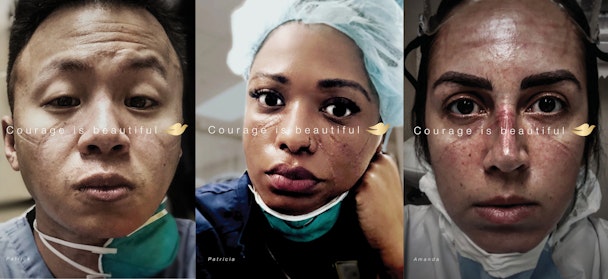Making the case for a little less cause marketing (and a bit more humor)
Don’t Panic founder Joe Wade (@Mrjoewade) wonders if adland’s obsession with cause marketing is hurting, rather than helping.

Dove’s campaign swept the board at Cannes
Building an emotional connection to a brand can be done in a variety of ways, but due to the groupthink of the ad industry, social purpose is now seen as the only option.
‘A trans woman walks into a Starbucks, and gets her name legally changed.’ That’s it, there’s no punchline because it’s not a joke. In fact, it’s a serious societal challenge being grappled with by Starbucks in order to sell coffee. We don’t actually know if it moves units because while these kinds of ads sweep the board at Cannes (where they’re upvoted by creatives, desperate to save their souls), they never seem to place in the pointy competitions such as the IPA Effectiveness Awards.
The other irksome thing about this whole approach is that Starbucks’s cup runneth over with evil deeds, including being supplied by coffee farms that employ children as young as eight to pick the beans, who work 40 hours a week and are paid about a latte a day. This is corporate legerdemain, more commonly called ‘wokewashing’ – when a corporation pulls focus on to a worthy but tangential issue so we don’t hate it for the fundamental nature of its actual business.
I’ve got another one: ‘Doctor, Doctor, your face looks like you’ve been wearing PPE for 12 hours straight.’
‘I have, but luckily I’ve got some Dove back at home.’
To be fair, Dove is one of the pioneers of social purpose advertising and its parent, Unilever, is trying to make its operations much more sustainable.
Again it smashed it at Cannes. And the fact that it’s less wokewashy means it better illustrates the point that even relatively clean brands have come to the conclusion that to build resonance with audiences they must associate themselves with a cause. In so doing they then have carte blanche to stir people’s emotions with a heady cocktail of black-and-white film, piano music and some cause or another with whatever it is that needs selling.
Here’s Robert DeNiro crying at an advert. It’s because his personality is unravelling.
The groupthink of the advertising industry is quite astounding, and now all ads must be worthy.
Here’s why that’s happening, in overly simplistic terms, and here’s how things could be different.
Why’s it happening?
Even professionals who work flogging people stuff they don’t need are developing a conscience, because the world is rapidly heading to hell in a handcart. And in the After-Times, when your now dreadlocked child looks you in your remaining eye and says, ‘Mummy, what did you do to try and save us?’, you want to be able to say, ‘I was one of the good guys and made adverts about how men should be nicer to women for a razor company.’ And one thing’s even truer than that last bit – social purpose is like catnip for the best hires, and so brands are falling over themselves to come up with one.
Why is Zuckerbot so damn rich? It’s because there’s so many brands competing for our attention and most other sorts of paid media are drying up. The search for purpose is one way of standing out on less spend. But what’s going to happen when every brand, even the most despicable ones (like fossil fuel, vapes or gambling) have found their calling and Ray Winstone is going on about how alpacas are endangered or something? Consumers have been shown to care about social purpose in numerous studies, but that doesn’t mean it needs to be the cornerstone of every comms campaign. If we make real progress it should be a given that a company has sustainable processes and makes a positive impact.
How to change things
As an agency that only works on social purpose campaigns, we’re definitely not against businesses using their purpose in their comms. However, let’s not use social purpose to polish unethical turds, like Starbucks. Instead the agency remit should broaden to help brands rectify their businesses in more meaningful ways. That’s the way we can drive change, and not just pretend to.
For legacy brands this is a big challenge, but one they are going to have to undertake at some point soon – or lose value as increasing numbers of investors look to ESG scores, and their customers grow more savvy to wokewashing. If changes aren’t made, the advantage is going to be handed to startups and scaleups with innate purpose, such as our clients Cushon, the world’s first net-zero pension.
Let’s also turn those frowns upside down and focus on funny. Laughter is a powerful way to build a connection to a brand, and if we’re willing to be bold and go all in, the laughs will return. Our creative team is made up of a fair few comedy writers capable of delivering laughs in a way traditional ad creative sometimes struggles to. In trying times funny ads are a relief from all the trauma and are likely to be well received – and don’t come with all the excess baggage of trying to shoehorn a cause into your comms.
